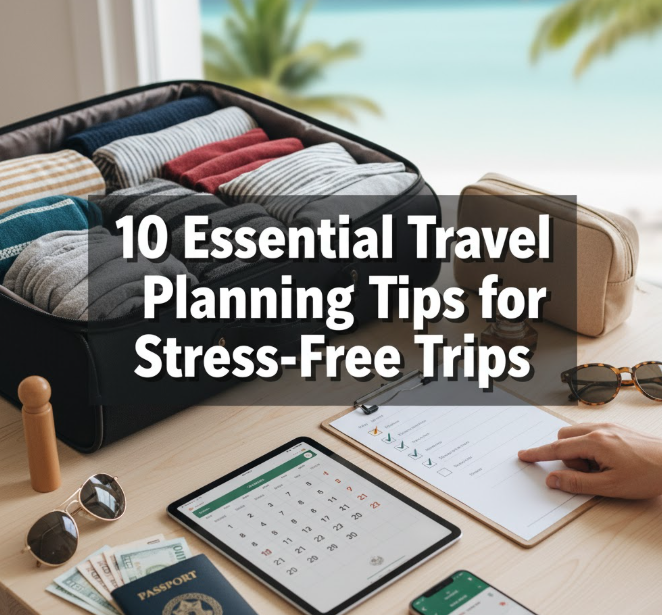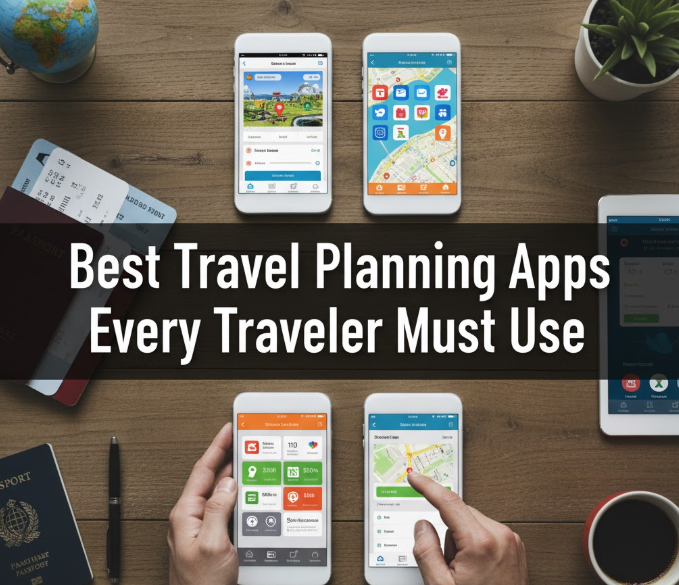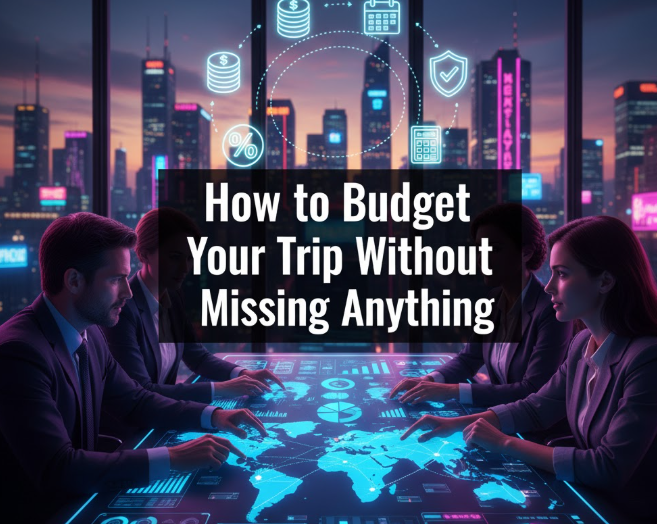Imagine this: You’re sitting at the airport, feverishly scrolling through your email for a confirmation that’s not there. Your phone is at 3%, you forgot to book airport pickup and you just discovered your passport expires in two months. Sound familiar? We all experience travel pitfalls, but they don’t have to be your own.
Whether you’re taking a weekend jaunt or a month-long voyage into different time zones, careful planning is the difference between an unforgettable adventure and one that you want to forget. The good news? It doesn’t take a professional travel planner to organize an amazing trip. With the right tactics and a little preparation, you too can plan a seamless, peace-of-mind inducing vacation that goes off without a hitch.
In this guide, we’ll go through ten actionable tips to change the way you think about trip planning. These aren’t fancy travel hacks or costly fixes — just honest tips that do work. Enough talk! Let’s jump in and make your next trip the best you’ve had.
1. Begin Planning Ahead (But Not Too Far Ahead)
Travel planning is all about timing. Open your browser too late, and you’ll face stratospheric prices and few choices. Begin too early, and you may lock in deals that aren’t actually the best.
Usually for domestic travel it is 2-3 months and for international it is 3-6 months. Since most of the seats have been made available by airlines during this window, prices aren’t inflated due to last-minute travel. When it comes to accommodations, 1-3 months is the sweet spot when you usually find the right balance of availability and pricing.
Here is what your planning to-do list should be like:
6 Months Before:
- Decide on your destination
- Apply for or renew passports as necessary
- Begin to save your spare cash for a trip
- Research visa requirements
3-4 Months Before:
- Book your flights
- Reserve major accommodations
- Request time off work
1-2 Months Before:
- Book activities and tours
- Make restaurant reservations
- Arrange transportation
- Buy travel insurance
2 Weeks Before:
- Confirm all bookings
- Check in for flights
- Pack your bags
- Notify your bank about travel
This allows you enough time to do the necessary investigation, compare costs, and generally make a wise decision without feeling rushed! You’ll also have the opportunity to pounce on sales and specials that arise.
2. Establish a Realistic Budget… and Stick to It
One of the leading causes of stress when traveling is money issues. Being broke in the middle of a trip or facing credit card debt when you get back home can turn even the best vacation memories into nightmares.
Before booking anything, take a seat and decide how much you can actually afford to spend. Be honest with yourself — not just about what you want to spend, but also what won’t burden you financially down the line.
| Budget Category | Average Percent | What It Includes |
|---|---|---|
| Transportation | 30-40% | Flights, trains, car rental, gas, local transit |
| Accommodation | 25-35% | Hotels, hostels, vacation rentals |
| Food & Dining | 15-20% | Restaurants, groceries, snacks, drinks |
| Activities | 10-15% | Tours, tickets, experiences, entertainment |
| Emergency Fund | 10-15% | Unexpected costs, medical/emergency coverage, extra cash |
After coming up with your budget, try to get the total down further by determining a daily spending limit. For example: If you’ve got a budget of $1,500 for a 10-day trip and have spent $500 of that on flights and hotels, then you’d have $100 per day to pay for other expenses. Track what you are spending with a basic note app or budgeting tool.
Pro tip: ALWAYS budget 15-20% higher than you actually think you will spend to account for things not on your list! For example, that adorable souvenir shop, an unexpected trip to the pharmacy or following a local’s great tip for an amazing restaurant can be costly if you haven’t budgeted for extras.
3. Choose the Proper Lodging for Your Travel Style
Where you sleep may matter more than you realize. The lodging decision plays a big role in your finances, time and the tenor of your trip.
Hotels are convenient, and many offer services including daily cleaning and front desk assistance. If you’re not dying to have a more traditional vacation experience and spending a little extra money isn’t an issue, they do the trick pretty well. For solo travelers or budget travelers who like the company of others, hostels offer a great option. Vacation-rental options like Airbnb offer added space and kitchen access, convenient for families or longer stays.
Consider these factors when choosing:
Location is everything: A cheap hotel an hour from all the attractions you want to visit in town doesn’t save you any money when transportation time and money are factored into the equation. Spend a little more and you’ll be central, which will save you money on time.
Look closely at recent reviews: Don’t just search by star rating — see what guests had to say in the past few months. Inspect details on cleanliness, noise levels and whether photographs reflect reality. Check out negative reviews to identify potential dealbreakers.
See what is offered: Some places include breakfast, WiFi, parking or airport transfers at no charge. These benefits can save you a lot of time and money. Check the math on what the true cost is when all of the extras are added up.
Consider the contours of your day: If you’re not a morning person, a hotel with more flexible check-in times could weigh more heavily in your decision than an opulent-looking breakfast buffet. If you’re going to be out exploring all day, you don’t need a large amenity-heavy resort.

4. Make a Flexible Itinerary
Most travelers are guilty of perhaps over-planning. Yes, you read that correctly — too much preparation can ruin your trip.
A busy schedule doesn’t allow for the random adventures, downtime and surprises that make traveling so much fun. You will wear yourself out toggling from one place to another, and you’ll miss things because you’re too busy checking items off your list.
Instead, create a flexible framework:
- Morning: Plan one major activity or sight
- Afternoon: List 2 to 3 options (which you can narrow down depending on weather, energy, and interest)
- Evening: Keep it loose… maybe make a reservation for one restaurant but allow yourselves some flexibility
This method provides guidance without locking you in. If you come across an irresistible local market, spend a few hours there without worrying that you are “running behind.” In case it rains, you have indoor backups ready.
Block out not less than one full day each week that you’re away. Spend this time taking it easy, walking around the neighborhood, doing laundry or returning to a spot you enjoyed. These rest days help you avoid burnout and frequently turn out to be the highlights of your trip.
Do your homework on where you are going, but don’t book everything. Decide what you want to see, check opening days and hours, book any must-do activities. But leave space for local suggestions and impromptu choices.
5. Pack Smart, Not Heavy
Overpacking is the rookie error, and it’s something even seasoned travelers do to this day. You might not want to part with those extra shoes or that “just in case” jacket at home, but they will become an annoying dead weight as you progress through your journey.
So here’s the reality: Anything you need, you can almost always buy it at your destination. Forgot sunscreen? Every corner store has it. Need an extra shirt? Problem solved in ten minutes. What you can’t buy easily is energy and mobility, both of which you lose when you’re lugging heavy bags.
The capsule wardrobe approach works:
- Pick 3-4 neutrals that all work together
- Pack versatile items that can double for various situations
- Pack 3-4 bottoms, 5-7 tops, one jacket and one dressy outfit
- Wear your bulkiest pieces (that includes heavy shoes, with a jacket) when you travel
Roll, don’t fold: Rolled clothes compress and wrinkle less than folded ones. Pack your stuff in packing cubes to save more space, and keep everything organized.
Essential items to never forget:
- Charge your phone and carry a portable battery pack
- Important medications (bring extras)
- Copies of important documents (passport, insurance, bookings)
- Tiny first aid kit with bandaids and painkillers
- Reusable water bottle
- Worldwide power adapter
Try living out of your packed bag for a day at home to test it. If you never use items, remove them. If you can’t carry your bag up a flight of stairs, it’s too heavy.
6. Get Travel Insurance (Seriously)
Travel insurance seems like a waste of money — until you need it. And then it’s the best investment you ever made.
In their minds, most travelers skip insurance “because nothing will happen to me.” But travel insurance is not only for big disasters like a medical emergency or missing your flight. That includes the common issues of lost luggage, stolen phones, a sprained ankle or having to leave early because of an emergency.
Typically, you’d pay 4-8% of your total trip for a full travel insurance policy. For a $2,000 trip, that’s $80 to $160 — a small price for some serious peace of mind.
What good travel insurance covers:
- Emergency medical care and evacuation
- Trip cancellation or interruption
- Lost, stolen, or delayed baggage
- Flight delays and missed connections
- Emergency assistance services 24/7
Read the policy details carefully. Some policies do not cover certain activities (skiing, for example), pre-existing conditions or travel to particular countries. Ensure that your policy covers what you actually intend to do.
Travel insurance is available as a perk with many credit cards, but benefits on these policies may be limited and come with specific rules. See what your card offers, but you might want to pair it with a separate policy for longer or pricier trips.
For more travel tips and flight deals, visit https://calltoflights.com.
7. Install Must-Have Apps and Save for Offline Reading
Your mobile phone is your most important tool when you travel, but it’s worthless if you can’t get information when you need it. You can’t always count on an internet connection or cell service.
Before you go, download offline maps for your destination on Google Maps or Maps.me. The features work when you’re offline and provide walking directions, business details and alternate public transit routes. Download crucial documents — boarding passes, hotel confirmations, tour tickets — so you can have them available without WiFi.
Must-have travel apps:
- Google Maps: Save offline maps for each city
- Google Translate: Download language packs for offline translation
- WhatsApp: Free messaging and calls over WiFi
- XE Currency: Offline currency converter
- Trail Wallet: Easy expense tracker
- Citymapper (major cities only): Plan your journey on public transit
Take screenshots of important information: Addresses in the local language, emergency contacts, booking confirmations and your current daily itinerary. Keep these in a separate folder on your phone for quick reference.
Record your embassy’s contact details and local emergency numbers (such as 911 in the US). 112 is also a universal emergency number in many countries.
Back up your photos consistently to the cloud (when you are in WiFi range) or a portable hard drive if you’re taking lots of photos. Losing your photos is one of the most heart-wrenching travel emergencies.
8. Get Your Home Ready Before You Go
Nothing ruins the mood of a vacation more quickly than feeling stressed from home. Spend an hour before you leave prepping your house and tending to essential needs.
Home security checklist:
- Have mail and newspapers stopped or picked up by a neighbor
- Put lights on timers to give the appearance that someone is home
- Keep mum about your travel plans on social media until after you return
- Let a neighbor or friend you trust know that you will be gone
- Clean your fridge and bring out the trash
- Unplug electronics to prevent fire risks and save energy
- Ensure the thermostat is adjusted for the season
Financial preparation:
- Inform your bank and credit card companies when and where you’ll be traveling
- Establish online bill pay for any bills that will be due when you are away
- Take at least two different methods of payment (cards from at least two banks)
- Stash away a little bit of emergency cash in U.S. dollars — it’s generally accepted or easily converted around the world
Ensure that someone has a copy of your itinerary and knows how to contact you. Do not forget to give a family member or close friend the address of your hotels, the flight details and any emergency contacts.
9. Get to Know Local Customs and Phrases
You don’t need to be fluent in a second language or become an expert in foreign culture, but learning some basic words and customs can demonstrate respect and help keep your travels running smoothly.
Essential phrases in any language:
- Hello/Goodbye
- Please/Thank you
- Excuse me/Sorry
- Do you speak English?
- Where is…?
- How much does this cost?
- Help!
- Bathroom/Toilet
Even if you mangle the pronunciation, locals appreciate the effort. Many people are also more receptive to your speaking with them in their language before switching to English.
Find out about basic cultural norms in your destination:
- Tipping etiquette (what to tip, whom to tip, how much)
- Dress code for religious places or formal destinations
- Greetings (handshakes, bows, cheek kisses?)
- Rules of the meal (who pays, how to order, eating with fingers?)
- Photography rules (where you’re not supposed to and who doesn’t like it)
Even minor cultural miscommunications can lead to some unnecessary awkward moments or even offend the other party. A few minutes of studying can keep you from looking foolish and will go a long way to help you fit in.
10. Be Smart and Trust Your Gut
Travel safety is not about paranoia — it’s about being informed and prepared. For the most part, destinations are perfectly safe for tourists — but trouble can crop up anywhere if you aren’t careful.
Your gut is your best safety device. If something seems off, there’s likely a reason for it. That “great deal” from the guy on the street? Probably a scam. The shortcut through a darkened alley at night? Take the longer, well-lit route. Let your instincts guide you and don’t fret about rudeness.
Practical safety tips:
Secure your valuables out of sight: A money belt or neck pouch to carry passport, spare cash and a backup credit card. Try not to flaunt expensive jewelry, cameras or phones for no good reason.
Stay conscious of your surroundings: Nothing makes pickpockets’ jobs easier than tourists with their faces buried in smartphones or maps. Instead of standing on street corners in a daze, step into somewhere safe while consulting the map for directions.
Research scams that are common at your destination: Every place has tourist tricks. A brief search on the internet for ‘common scams in [location]’ will arm you with what to look out for and how to avoid falling foul.
Share your location: Use share features on your phone to share location anytime you are out alone or at night with a trusted contact back home.
Understand your alcohol limits: Being drunk in a strange place is much more dangerous. Take care, especially in the early days when you are still getting to know your bearings.
Copy documents: Keep digital and hard copies of your passport, visas, travel insurance and important phone numbers separate from their originals.
Keep in mind that the overwhelming majority of travelers have safe, happy trips. Don’t let fear ruin your trip however—travel smart and be prepared.
Bringing It All Together
You can’t manage every last detail, and you cannot shed every semblance of uncertainty. It’s about being strong enough to navigate the whatever arises while leaving space for wonder and discovery.
The ten tips we’ve looked at — from calculating the right planning period to keeping safe on the roads — function together as pieces of a puzzle that build an insurance policy against stress for travel without tears. Some will be more important for some trips than others. A weekend camping getaway requires different preparation than a two-week trek abroad. Adjust these tactics according to your needs.
Rest assured, no matter how well you plan, something unexpected will almost certainly come up. Flights get canceled, restaurants are closed, weather doesn’t hold up — or your plan changes. That’s not a planning fail — that’s just travel. The thing is, when you’ve been well prepared, little mishaps become irritations rather than catastrophic events.
Start with your next trip. Choose a handful of tactics from the list that you have never attempted and give them a whirl! Perhaps it’s making an honest budget (with a real emergency fund, this time) or getting travel insurance. You’ll find out what suits your style and what doesn’t every time you leave town.
The best trips aren’t the ones when everything goes perfectly according to plan. They’re the ones where you’re prepared enough that surprises don’t lead to stress. So begin planning, keep flexible and get ready for the adventure of a lifetime.

Frequently Asked Questions
How many days in advance should I book my trip?
For optimal prices and availability, book flights 2-3 months in advance for domestic travel and 3-6 months for international travel. Accommodation reservations should be made 1-3 months ahead. But if you’re traveling at the height of tourist season or during a holiday period, add another month or two to these timeframes.
Do you need travel insurance for all trips?
Travel insurance is a good idea if you are going on an international trip, going to be doing expensive activities, or need protection in case you have to cancel for some reason. For a quick domestic weekend away where you’re driving and staying with friends, you might find yourself skipping it. For just about everything else, the cost is worth the protection.
How much should I spend per day while traveling?
This is all over the map by destination, but in general: on a shoestring, you can get by with $50-75 per day in inexpensive countries; mid-range travelers would spend $100-200 daily; and luxury travelers should budget for $300+ each day. Research your destination and adjust for your travel style. You should always add a buffer of 15-20% for miscellaneous things that come up.
What is the best way to carry money when traveling abroad?
Charge on a credit card with no foreign transaction fees, withdraw local currency as needed (skip the kiosk exchange services), and carry some US dollars for backup. Let your bank know you are traveling, so they don’t freeze your cards thinking they have been stolen.
How can I avoid overpacking?
Plan outfits in simplistic styles and colors that you can mix and wear multiple times, pick versatile items that can be dressed up or down for a variety of things to do, and remember — laundry is your friend when you reach your destination. If you can’t easily tote your full pack up a flight of stairs, you’ve overpacked.
Do I need to prebook tours and excursions before I arrive?
Book popular activities that sell out ahead of time (major museums, special tours, limited-capacity experiences) but leave some space in your schedule for serendipity. A couple of must-dos gives you something to chase, but having the rest of the days free allows for flexibility and locals’ best tips.
How can I get internet access when traveling internationally?
Your options include buying a local SIM card when you reach your destination (usually the most cost-effective option, especially for longer trips), getting an international phone plan from your carrier (convenient but often costly), renting a portable WiFi device that connects to the local network where you are (a good choice if there is more than one of you), or relying only on public WiFi in hotels, cafes or restaurants when it’s available.
What happens if my trip goes wrong?
Keep calm, and try to work through problems one at a time. If you have coverage, get in touch with your travel insurance provider as soon as possible. Save any documents related to the problem (receipts, police reports and photos). Most travel issues have a fix — delayed flights can be rebooked, lost belongings replaced and even medical problems taken care of given the right insurance and resources.






